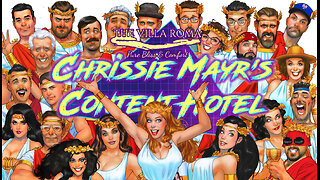Premium Only Content

Uncontrollable Urge Whip It (I Can't Get No) Satisfaction That's Good Mongoloid Beautiful World Devo
Uncontrollable Urge Album: Q: Are We Not Men? A: We Are Devo! (1978)
Whip It Album: Album: Freedom Of Choice (1980)
(I Can't Get No) Satisfaction Album: Q: Are We Not Men? A: We Are Devo! (1978)
That's Good Album: Oh, No! It's Devo (1982)
Mongoloid Album: Q: Are We Not Men? A: We Are Devo! (1978)
Beautiful World Album: New Traditionalists (1981)
by Devo
Uncontrollable Urge is the first track of Q: Are We Not Men? A: We Are Devo! which is the debut studio album by Devo. It was originally released in August 1978 on Warner Bros. in the North America and Virgin Records in Europe. Produced by Brian Eno, the album was recorded between October 1977 and February 1978, primarily in Cologne, West Germany.
The album peaked at No. 78 on the U.S. Billboard chart and No. 12 on the UK Albums Chart. Retrospectively, the album has been included on several "best of" lists from publications including Rolling Stone, Pitchfork, and Spin.
Jerry Casale and Mark Mothersbaugh formed Devo when they were at Kent State University. Casale told Songfacts how this song came together:
"'Whip It,' like many Devo songs, had a long gestation, a long process. The lyrics were written by me as an imitation of Thomas Pynchon's parodies in his book Gravity's Rainbow. He had parodied limericks and poems of kind of all-American, obsessive, cult of personality ideas like Horatio Alger and 'You're #1, there's nobody else like you' kind of poems that were very funny and very clever. I thought, 'I'd like to do one like Thomas Pynchon,' so I wrote down 'Whip It' one night. Mark had recorded some sketches for song ideas in his apartment, and when we'd get together every day to write, rehearse and practice, we would listen to everybody's snippets of ideas. He had this tape with about eight things on it, and one of them had a drum beat that was very interesting, it became the 'Whip It' drum beat.
Then three other songs had pieces of what became the 'Whip It' song, except they were in different time signatures and different tempos. I put them all together into one composition. All the parts of the song got rolled into one song. Then we started putting the lyrics over the top of it and liked the idea of how it was working out. We started practicing it every day, until we got it to the point where we really liked it and we thought it was really snappy. Then we recorded it. We didn't like it any better or any less than any of the other songs we were doing, and we had no idea it would become a hit."
"Whip It" got a big boost from the radio industry trade magazine Friday Morning Quarterback, whose publisher, Kal Rudman, loved the song. After reading about it in FMQB, some program directors put the song in rotation, and it got a great response, creating a buzz that led other stations to play it. In an interview, Casale said: "It spread around the country. All the DJs and people hearing it assumed it was a song about beating off or sadomasochism, so we let them think that. We didn't want to ruin it and tell them the truth, because they just wouldn't get off on the truth."
When MTV launched in 1981, they had very few videos to choose from. Some European and Australian artists had been making videos, but very few came from US artists, and most of those were concert videos. Devo had been making interesting videos for a while because they thought Laser Discs were going to catch on and wanted to make film shorts with music soundtracks that people could watch on them. Laser Discs never caught on, but MTV did, which gave this video lots of exposure.
Jerry Casale stated about the video: "We made a video to it for like $15,000 that was shot in our rehearsal studio. We kind of magnified that myth that this was a song about whipping and sadomasochism. We decided to make the video feed that popular misconception and had a lot of fun doing it. It was one of the few times Devo worked like that, usually we would start with a visual idea or story and write music to fit it. In this case, we didn't originally have a video idea for 'Whip It,' and when people started thinking it was a song about whacking off or sadomasochism, we had these quack books that we would collect from junk stores or vintage magazine stores that served as inspiration or jokes. There was this one magazine that I found in a store in Santa Monica. It was a 1962 men's girlie mag called Dude, I think.
There was a feature article on a guy who had been an actor and fell on hard times, he wasn't getting parts anymore. He moved with his wife to Arizona, opened a dude ranch and charged people money to come hang out at the ranch. Every day at noon in the corral, for entertainment, he'd whip his wife's clothes off with a 12-foot bullwhip. She sewed the costumes and put them together with Velcro. The story was in the magazine about how good he was and how he never hurt her. We had such a big laugh about it, we said, 'OK, that's the basis for the video. We'll have these cowboys drinking beer and cheering Mark on as he's in the barnyard whipping this pioneer women's clothes off while the band plays in the corral.'
Back then, nobody cared. MTV had just started up in three cities, we had already shot five videos before Whip It, and nobody cared. There was no industry around it, there were no gatekeepers, there was no pecking order, there were no video commissioners, there were no representatives going, 'No, you can't do that, we won't show that.' There wasn't enough money or power involved for anybody to care, so we were just considered crazy artists that went out and did whacko things. So we made the video and one day we started showing it in concerts and then MTV started playing it."
Whip It was influenced by the political climate. Mark Mothersbaugh told Songfacts: "We had just done our second world tour when we started writing our third album. The one thing that we were impressed with that we noticed everywhere around the world was that everybody was totally freaked out by American politics and American foreign policy. At the time, Jimmy Carter was in charge. I thought of 'Whip It' as kind of a Dale Carnegie, 'You Can Do It' song for Jimmy Carter."
Whip It was one of the first hit songs that used a synthesizer as the lead instrument.
Devo's music and videos were based on the concept of "De-Evolution," meaning that mankind is regressing. They dressed alike in their videos to convey the lack of individuality in the world. Said Casale, "I think a lot of Devo is in 'Whip It.' There's Americana mixed with something menacing, there's irony and humor, there's a hook and a big dance beat, there are interesting synth parts, lyrics that aren't the typical lyrics about getting laid or losing your baby. Although we weren't trying, it was a pretty concentrated dose of Devo in 'Whip It.'"
Often considered a punk band, Devo added another dimension to the genre by making the visuals just as important as the music. "From the beginning, on purpose, Devo was a multimedia idea," Jerry Casale said. "There was no name for 'Performance Art' at the time. That term didn't exist, although I think that's what we were doing when I look back at it. It's exactly that, Devo represented an attitude, a point of view, a philosophy. It was like combining film-making and theatrics and cutting-edge kind of synthesizers and rock beats all rolled into one big performance with a lifestyle message behind it, which was basically to beware of illegitimate authority and think for yourself. Hardly a revolutionary idea, but it turns out to be more revolutionary as people's freedoms are slowly eaten away."
In 2003, this was used in a commercial for Swiffer wet mops. In the ad, a woman cleans the house with a Swiffer while doing robotic motions like Devo. When her daughter, who appears to be a junior-high Goth girl, sees her, she says, "I hope it's not genetic."
Casale's thoughts: "The concept of that commercial is a generation gap where 'Whip It' is being used as a put-down of the girl's mother. She's stuck in the '80s and swiffing away to Whip It and the kid thinks she's weird and is embarrassed by her. It's perfect that while Devo, when we came out we were a critical success and loved by people, we were pretty much overlooked by radio and MTV. MTV turned on Devo around 1981 and quit showing stuff and didn't want anything to do with us. They said, 'Unless your song's a hit, we're not playing your videos.' What's funny is, we never made any money, and only through publishing now are we making money, ironically for the wrong reason. But built into Devo was that comment on how society works and how people see things different ways and there is no one explanation of reality and that people do not share one logical idea of reality. This just proves it. We don't feel bad about the little bit of money that trickles to us now that we never got in the first place because they used these songs in a terrible way. It's almost more subversive because you go, 'This can't be, it's all wrong.' By misusing it so badly, they've created something that amuses us, entertains us."
Proctor & Gamble, who make the Swiffer, originally had Devo re-record this for the commercial as "You must swiff it," but their lawyers found out that copyrighting "Swiff It" and the product implications down the line could cost them hundreds of thousands of dollars, so they changed the lyrics to "You must Swiffer" so they wouldn't have to copyright "Swiff It."
Because of a bad publishing deal Devo made in 1978, they control only the publishing rights to their songs, not the performance rights to the actual recordings. When they allow their songs to be used in commercials, they insist on re-recording them so they can keep all the performance rights. In the Swiffer commercial, that is Mothersbaugh's vocal with lyrics written by Proctor & Gamble.
This has also been used in ads for Gateway, Twix and Pringles. In the Gateway commercial, the chairman of the company is driving an 18-wheeler with the Gateway cow riding shotgun. The cow produces a CD labeled "Cow Mix," and when they listen to it, this comes on and the chairman and the cow sing along. That ad is one of Mothersbaugh's favorites.
Whip It was Devo's only hit, but they have a large following of "Devotees" and an influence that reaches far beyond their sales numbers. Most mass market exposure to their other songs came when they were used in commercials, like "Beautiful World" for Target. They've long been a favorite on college radio, and enjoyed a resurgence when streaming made their music more accessible.
Outside the band, they are also quite accomplished: Mothersbaugh and other members of Devo started a company called Mutato Muzika that develops music for movies, TV shows and commercials. Casale is a successful director who has worked on videos by Rush, The Foo Fighters, Soundgarden and many others.
Whip It song is playable in Donkey Konga for the Nintendo GameCube.
Senior citizen singers the Del Rubio triplets made this song a big part of their stage show, performing it on acoustic guitars. They made many TV appearances in the '80s, usually performing in a campy style and wearing skimpy outfits.
The Brian Welch fronted nu-metal band Love and Death covered this in 2013 for their Between Here & Lost album. Their version features Matt Baird of the Arkanas hard rock band Spoken. Welch recalled to Noisecreep: "He was just in town during the recording and Jaren (Rauch, producer) mentioned it. He said it would be cool to have a guy to scream on there and so I totally tried it. You wouldn't believe it, at nine in the morning, he got up - you're hearing him with morning voice and everything and we just threw him on there."
This was prominently featured in the season 2 premiere of Stranger Things, "MADMAX," when the kids go to the arcade
Devo released their rendition of "(I Can't Get No) Satisfaction" as a single in 1977, initially in a self-produced version on their own label Booji Boy Records. The song was re-recorded with Brian Eno as producer for their first album, and that version was also released as a single in 1978, this time by Warner Brothers Records, after it was played for Mick Jagger's approval. The band filmed a video for the song that would later feature regularly on MTV, while a performance on SNL gave them a national profile. Decades after its release, Steve Huey of AllMusic would write that the cover version "reworks the original's alienation into a spastic freak-out that's nearly unrecognizable". This version of the song was featured prominently in the 1995 Martin Scorsese epic crime film Casino. Devo's version also featured in Netflix's series Sex Education.
Devo's version arose from the group's jam sessions, starting with a guitar part from Bob Casale, joined by a drum beat by Alan Myers and a bass part by Gerald Casale. At first, the band tried the lyrics to "Paint it Black," switching to "Satisfaction" when it didn't fit the music.
The quirky music video for the song and several others from this album received significant airplay on the upstart MTV. A notable feature of the video was dancer Craig Allen Rothwell, known as Spazz Attack, whose signature dance move, a forward flip onto his back, drew him significant attention.
"That's Good" is a song written by Mark Mothersbaugh and Gerald Casale. It appears on their fifth studio album, Oh, No! It's Devo (1982). According to Casale, "the lyrics deal with the ambiguity that if everybody wants what you want, how can everybody have it if everybody wants it and what happens when everybody tries to get it, and maybe you should change what you want."
Billboard called it "an almost-straightforward rocker" that is similar to "Whip It".
The music video for "That's Good" eschewed Devo's previous narrative style for a basic performance against a bluescreen background displaying related visuals to the song. This was intended to replicate the band's intentions for the forthcoming tour for those who would be unable to attend. The video for "That's Good" was one of the first videos that ran into censorship troubles on MTV. The juxtaposition of the image in a cartoon of a french fry penetrating the hole of a doughnut and then quickly cut to a writhing, smiling nude woman, shot from the neck up, was considered too risqué for airplay. In an interview with band member and video director Gerald Casale for the book Devo's Freedom of Choice,
"We got this call from [MTV co-founder] Les Garland, He was like, 'Look, we know what you're trying to do here.' I go, What do you mean? He goes, 'Ya know, when that cartoon French fry glides through that cartoon donut and then it's with the girl looking happy. You can have the French fry, or you can have the donut, but you can't have the French fry and the donut, Otherwise, you can't cut to the girl.' And I go, 'But what about when the French fry hits the donut and breaks in half and she's sad?' And he goes 'Alright you little smart ass.' It was horrible. Then I go, 'What about that Billy Idol video you have and the girls are in skin-tight pants and their asses are full on in the screen and his head is between her legs and then somebody slaps her ass? What about that?' He goes, 'we're talking about you, we're not talking about them."
Casale eventually relented and made significant cuts to the video, which he regrets because by then, "the song was going down in the charts, not up."
The word Mongoloid was originally used as a derogatory term for people of Mongolian descent in East Asia, but it was later used as an equally derogatory term for a person with Down syndrome, which is how it's used in this song.
The song reclaims the word, with the main character a proud mongoloid who is happier than most and has a job. No one even knows he has a condition.
Mark Mothersbaugh of Devo explained in an interview with Smashing Magazine: "In the bigger sense of things it was questioning man's calling himself superior to all other forms. It was just calling into question the insanity of what our value system was."
He said that while some radio stations found it objectionable and refused to play the song, the band heard from parents of kids with Down syndrome who said their kids loved the song.
"They were happy to have a song about them," Mothersbaugh said. "It wasn't making fun of mongoloids. It was kind of questioning why the value system of humans is about going out and getting a job, just mindless toil."
"Mongoloid" was Devo's first single, released with "Jocko Homo" as the B-side. The band formed at Kent State University in the wake of the tragic on-campus shootings of 1970. Their music reflected their mantra that humans were evolving backward, thus we were regressing, going through "de-evolution."
Mongoloid is an expression of that tenet, showing how the mongoloid, a person perceived as an outlier with a deformity, is actually the only one who has it figured out.
Mongoloid was written by Devo co-founder Jerry Casale, who along with Mark Mothersbaugh is a primary songwriter in the group. Casale shares lead vocals on the track with the group's guitarist, Bob Mothersbaugh (Mark's brother).
Devo included a new version of Mongoloid on their first album, Q: Are We Not Men? A: We Are Devo! in 1978. This version added more instrumentation and has a lot more production value - it was co-produced by Brian Eno of Roxy Music fame. "Mongoloid" was never a hit but became one of Devo's most popular songs, played at most of their concerts.
The line, "He was a mongoloid, one chromosome too many," is an accurate description of Down syndrome, which occurs when a person is born with an extra chromosome.
The filmmaker Bruce Conner made a short film set to Mongoloid that served as its music video. The band isn't in it - Conner's film is comprised of newsreel and movie footage showing science experiments and people engaged in strange behavior, like a guy pulling a bus with his teeth. Conner made the film after seeing Devo in Concert. His exhibit calls it "A documentary film exploring the manner in which a determined young man overcame a basic mental defect and became a useful member of society."
During live performances, Mark Mothersbaugh would play the part of the mongoloid, moving to the front of the stage and doing gestures like a cheer routine. He later added pom poms to the act.
Don't let this one fool you. Most of Beautiful World is about how wonderful the world is, a "sweet romantic plac with beautiful people everywhere." But at the end, it turns around with the line, "But not for me."
Jerry Casale of Devo said "We wanted to get everybody into a mood where people thought Devo was saying the world was really nice and saying the world was beautiful, then it turns out to be one man's opinion, which is mine, which is, while the world could be beautiful, it's not for me because of what I'm seeing."
Devo was founded by Jerry Casale and Mark Mothersbaugh, who were both at Kent State University when four unarmed students were shot to death by the US National Guard. This had a profound effect on Jerry and Mark, who developed the idea of "De-evolution," meaning that humans were devolving rather than evolving. Devo made short films to accompany their songs with the idea of releasing them on Laser Disc, a promising technology that was a huge failure. Even though Laser Discs didn't work out, MTV launched in 1981 and created a market for music videos. With very few videos to choose from, they put Devo's "Whip It" in heavy rotation, but when music videos became more common, MTV abandoned Devo.
Mark Mothersbaugh and Jerry Casale tried to sing like Stan Ridgway of Wall Of Voodoo ("Mexican Radio") on Beautiful World. "I don't know why, but we could imagine Stan singing that song," Mothersbaugh said. "So we were both trying to fake his accent and Jerry did a great job so he ended up singing on the record."
Beautiful World was written with the video in mind. "The video idea preceded the song," Jerry Casale told Songfacts. "We start off with silly imagery taken from archival film libraries of just stupid stuff - Americana pop culture stuff from the past and silly imagery of silly people, then slowly start warping it over darker and darker things - Ku Klux Klan race riots, war, suffering, atomic bomb, starvation. It transforms from one thing to another."
Rage Against The Machine covered Beautiful World on their 2000 album Renegades, the last album the band released. They turned the song into a sad, sentimental dirge. When they played it live, they performed it on acoustic guitars.
Many of Devo's songs have been used in commercials. The ads often misinterpret the songs or clash with Devo's philosophy that people should think for themselves. Says Casale, "Today, when people use Devo's music in commercials, they either completely miss the point or excise the irony on purpose. Target used 'It's A Beautiful World,' and of course, left out the line 'For you, for you, but not for me.' They just made it a beautiful world straight up."
When Devo's songs are used in commercials, the band re-records them so they can keep the performance rights. Early on, they signed some bad contracts and never made much money from their songs. Allowing their songs to be used in commercials means they can finally make some money from them.
As for how they feel about their songs being used to sell products, Mothersbaugh says: "We were so far out of left field that we were always intrigued with the idea of making commercial art and fine art intersect. We were always really impressed with people that did a good job of it and felt like there was much more of a chance to change things then to just butt heads. Some of our better successes were things that were more subversive."
Mothersbaugh runs Mutato Muzika, a company that makes music for many TV shows, movies and commercials. Casale is a successful director who has worked on many music videos and commercials. He directed all of Devo's videos.
-
 11:51
11:51
Psychological operations
17 days agoBrick One Angry Dwarf And 200 Solemn Faces Army Ben Folds Five
33 -
 LIVE
LIVE
Pop Culture Crisis
2 hours agoJK Rowling Calls Out HARRY POTTER Director, Sydney Sweeney Dating Scooter Braun? | Ep. 909
366 watching -
 LIVE
LIVE
The HotSeat
58 minutes ago👉 America’s Sex Drought: The Death of Real Men
594 watching -
![[Ep 739] Back to School Indoctrination | Dems Devalue Life | Covid Vax | Sam Anthony - [your]NEWS](https://1a-1791.com/video/fww1/79/s8/1/s/D/C/e/sDCez.0kob.1-small-Ep-739-Back-to-School-Indoc.jpg) LIVE
LIVE
The Nunn Report - w/ Dan Nunn
1 hour ago[Ep 739] Back to School Indoctrination | Dems Devalue Life | Covid Vax | Sam Anthony - [your]NEWS
125 watching -
![Special Guest Patrick Byrne Breaks Down President Trump’s Massive Announcement [EP4701]](https://1a-1791.com/video/fww1/f5/s8/1/y/_/C/e/y_Cez.0kob.3-small-Special-Guest-Patrick-Byrne.jpg) LIVE
LIVE
The Pete Santilli Show
50 minutes agoSpecial Guest Patrick Byrne Breaks Down President Trump’s Massive Announcement [EP4701]
138 watching -
 UPCOMING
UPCOMING
Chrissie Mayr
6 hours agoChrissie Mayr's Content Hotel at The Villa Roma! Anthony Cumia, Dave Landau, Violet
229 -
 LIVE
LIVE
The Tom Renz Show
40 minutes agoIs Trump Finally Waking Up On the mRNA COVID Jabs?
180 watching -
 DVR
DVR
Futures Edge: Finance Unfiltered with Jim Iuorio and Bob Iaccino
1 hour agoLIVE Technical Analysis with Mike Arnold
7 -
 3:47:18
3:47:18
Right Side Broadcasting Network
7 hours agoLIVE REPLAY: President Trump Makes an Announcement - 9/2/25
159K64 -
 1:31:39
1:31:39
The Quartering
2 hours agoAlex Jones Goes To WAR With Owen Shroyer, Are All Women Terrible?, Woke Backfire Of The Year!
70.3K24